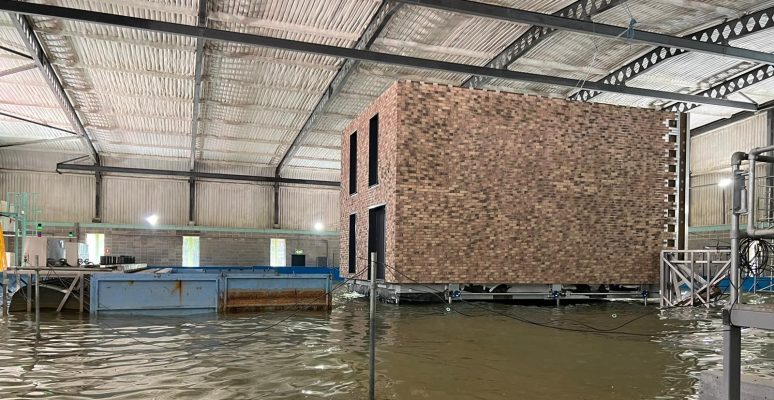
Technology Research Managers from the Flood Innovation Centre recently had the opportunity to see the prototype of one of the innovative products that they’ve championed in action – a house that’s designed to rise above the water when it detects flooding!
Members of the team worked closely with the product’s designer, Doncaster-based Andrew Parker, whose background is in domestic construction. Andrew first came up with the idea for the FloodSafe House in 2012, having seen at first hand the devastation that flooding caused to his friends and family. He then founded FloodJack International and created a full-size build that could be rigorously tested. The FloodSafe system is designed to detect a flood event, triggering the house to rise above flood waters on a specially designed mechanical jack system, protecting both property and residents.
The Flood Innovation Centre supported FloodJack International Ltd to accelerate the commercialisation of Andrew’s product, which was designed with the kind of modular build techniques that are routinely used in affordable and social housing developments in mind. With a focus on end-users, including housing associations and potential residents, the Flood Innovation Centre carried out an evaluation of the social and ethical impacts of the FloodSafe system. They also developed a flood impact mitigation strategy, reviewed the social and ethical issues relating to the use of the product and developed communications with these issues in mind.
Technology Research Manager Hiatt Jackson added:
“We also helped develop a person specification and job outline for a new FloodJack International Ltd employee, to support the growth and development of the product from a holistic angle. Finally, we produced a social value projection for the company to use to secure future investment.
“We’re delighted to have been able to work with Andrew and help him bring his product to market more quickly. It was wonderful to be invited to HR Wallingford, a specialist facility near Oxford, to see a life-size prototype of the product Andrew designed in action and we look forward to seeing what the future holds for the FloodSafe House.”
Andrew Parker, who first met members of the Flood Innovation Centre team when he attended one of their events, said:
“Working with the Flood innovation Centre challenged me in areas that I had never thought would be relevant to the commercialisation of the FloodSafe House, but proved to be a pivotal element that I was missing. Understanding the occupiers’ point of view, the first responders’ actions during a flood and the social value the FloodSafe House could produce was something that I needed to get to grips with and enabled me to make small redevelopments to the product. For example, what should the occupiers do when there is a flood? Do the first responders turn the electric grid off or is it a power cut? It was also about understanding the real value of being able to remain in your house during a flood, and the speed of return to normal life. I would recommend anyone bringing a new flood product to market to go through this process; it is challenging and pushes you in different directions, but it’s definitely worth it.”
Technology Research Managers from the Flood Innovation Centre are supporting dozens of businesses across Yorkshire and beyond with the development of innovative flood-related products and services. They’re able to offer support relating to all aspects of flooding to eligible businesses from a broad range of sectors to help them turn their goals into a reality.
Among the organisations that they’re working with are East Yorkshire-based 2B Landscape Consultancy, whose Director, Bill Blackledge, explained:
“When 2B Landscape Consultancy discussed using the University’s funded Flood Innovation Support package, it was obvious to think about West Wolds Slow The Flow, a partnership set up by 2B to look at nature-based solutions to flooding in its area. 2B needs a better understanding of drone-based surveys, and we wanted to apply that learning through a practical and useful example, to fill a gap in local topographical data. The Flood Innovation Centre’s equipment is cutting-edge – we are privileged to be getting the benefit of it.”
Members of the team are also supporting Hull-based Community Interest Company HFR Solutions to develop an innovative approach to the devastating effects of flooding and the impact it has on communities at a regional and national level, as well as working with East Yorkshire-based M.B. Roche Civil Engineering. Dan Roche commented:
“Seeing what new products were out there was really good but even more important was getting the connections with people. Now if I see an opportunity, I have the confidence to apply for a tender. I can speak to the Flood Innovation Centre if there’s a part of the contract I’m not sure of. I’d strongly recommend getting signed up for one of the courses, not just for the knowledge but also for the contacts that you get.”
Flood Innovation Centre Project Manager Pip Betts explained:
“Whether you’re exploring a new product, service or approach or you need expert advice and access to facilities, our team of Technology Research managers can connect you with the right people to drive your project forward. We can support your business to expand into new markets, increase sales opportunities or diversify your product range. Our funded support packages are designed to help businesses get the support they need to transform flood resilience ideas into reality.”
Established by the University of Hull and located in the Humber region, the Flood Innovation Centre brings together industry contacts, exceptional academic research and cutting-edge equipment.
The level of business support on offer to eligible businesses ranges from 12 hours to ten days and can include in-depth, sector-specific workshops, design and testing services, visual reality modelling, prototyping and much more.
For more information about the support provided by the Flood Innovation Centre, visit: https://floodinnovation.co.uk/services/, email flic@hull.ac.uk or telephone 01482 462275.